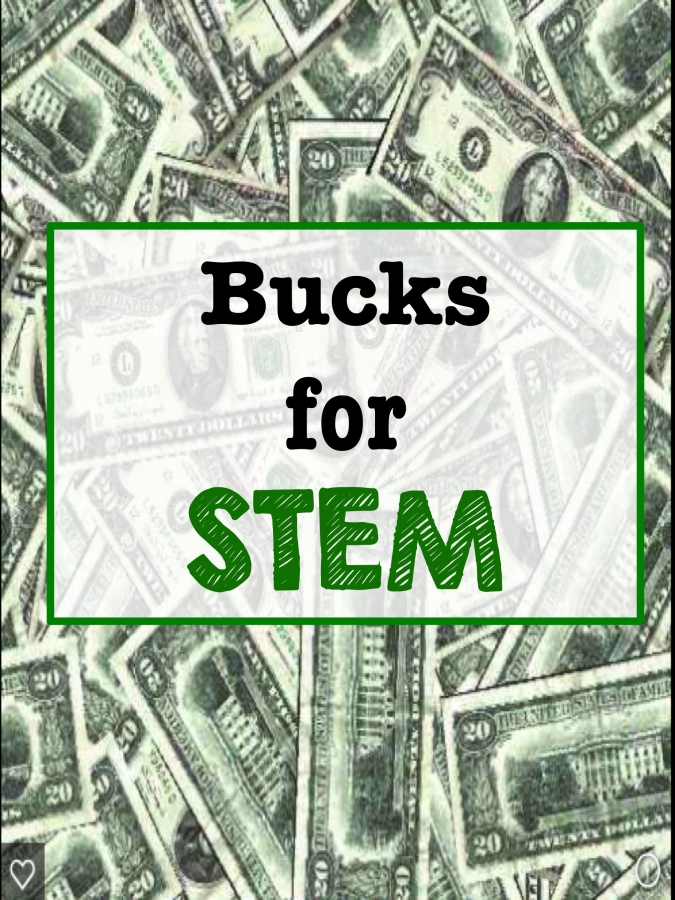Bucks for STEM
“Nothing ventured, nothing gained”
The new school year brings to the classroom recharged batteries and new ideas to try. Perhaps you are considering adding some new STEM lessons or a Maker Space to your curriculum. Although it is possible to add both with very little money, it is also exciting to consider the purchase of some fabulous products that are now on the market. Little Bits Electronic Kits, 3-D printers, Makey Makey, and Goldie Blox kits are just a few of the exciting materials that are now available to enhance a STEM curriculum or Tinker Lab. Funding for these, though, can be an issue for most teachers. Luckily, there are options available to finance extra purchases. They take a bit of work but are well worth the effort. Before you begin the funding journey, it is crucial to prepare some basic information. First, what problem are you trying to solve? You may really want a Makey Makey kit, but unless you can clearly explain how it will be used to solve a problem such as raising science test scores, or increasing parent participation, chances are slim that you will receive funding. This is also the time to gather data to support your request. Keep a notebook with up to date numbers on the various student groups such as English Language Learners or Economically Disadvantaged Students that would benefit from your project and what percentage of the school’s population they represent. You also need to research your district’s policy for receiving funds. Small amounts are usually controlled at the local level but be aware that larger sums frequently have to be administered by the district and you will need their approval of the application as well as for the financial distribution. Each district has their own requirements for this so it is wise to learn the details for your particular area before you write the grant. It would be sad indeed to work hard on a grant, have it funded and then lose control of how the money was spent. You have several options for funding so let’s explore a few that we feel are not difficult applications.
Project Donations With these two sites you list your project and have people donate towards it. Families, grandparents, former students, businesses, and compete strangers who like your project can donate. Often there are matching funds from a corporation or celebrities, and sometimes even surprise funding for all projects in a particular location.
- Donors Choose http://www.donorschoose.org
- Adopt a Classroom http://www.adoptaclassroom.org
Grants Grants not only require a detailed application but also follow-up information as to the success of the project. It is very important to keep good records of purchases and data on results of the project. Although many grants require extensive work, there are also many that are not difficult and certainly worth the effort.
AIAA Educator Associate Classroom Grant- This grant is open to AIAA Educator Associate members (and membership for K-12 educators is free). The application window opens October 1 and projects must have an aerospace focus. The maximum amount is $250, but teachers in Washington, Oregon, Idaho and Alaska can also apply for up to an additional $250 in funding. https://www.aiaa.org
National Girls Collaborative Project Mini-Grants- NGCP mini-grants are designed to build collaboration between programs and resources.
Mini-grant application resources, including a
sample application,
exemplary practices,
project ideas, and frequently asked questions are available online. The application window varies by Collaborative, so check the website.
http://www.ngcproject.org/mini-grants Air Force Association Educator Grants- Each school year, the Association awards grants to projects that significantly influence student learning. The application window opened in July and closes in November. Projects must be tied to the curriculum and promote aerospace education.
http://www.afa.org/informationfor/teachers/k12grants/educatorgrants Herb Society Grants The Herb Society of America's mission is to promote the knowledge, use, and delight of herbs through educational programs, research, and sharing the experience of its members with the community. The Grant for Educators challenges individuals, groups or small businesses to develop and deliver learning experiences to the public. Each year, the Grant Committee anticipates funding one or two grants for a total of $5,000. The grant rewards innovative projects that enhance herbal education in school systems, in communities, or in any public forum (electronic or person-to-person). It requires learning goals and a mechanism to measure the educational outcomes.
http://herbsociety.org/resources/educator-grants.html Lowe’s Grants and Awards Lowes has very generous grants and awards for schools. Deadlines are coming up in October.
http://www.toolboxforeducation.com/index.html Association of American Educators- AAE offers grants to all full-time teachers who have not received a grant from them in the past two years. The application window opens October 1 and can be used for a number of projects and materials. http://www.aaeteachers.org/index.php/classroom-grant-application
The Captain Planet Foundation Captain Planet funds and supports hands-on environmental projects for children and youth. Its objective is to encourage innovative programs that empower children and youth around the world to work individually and collectively to solve environmental problems in their neighborhoods and communities. Grant amounts range from $500 to $2,500. Deadlines for submitting grant applications are
September 30 and
January 31. Organizations with operating budgets of less than $3 million may apply
http://captainplanetfoundation.org/apply-for-grants/ Business Partners As Mr. Rogers sang, ”Who are the people in your neighborhood? “ Make a list of businesses small and large that are within 10 - 15 miles of your school. With large corporations such as department stores, hardware stores, discount stores or hotels visit their website and see what their policies are on donations, grants or community outreach. You will find a wide range of possibilities; anything from providing volunteers, grants, fieldtrip funding, to donations of materials. With small local businesses it is worth the effort to make contact and ask how they would like to support your program. Sometimes just a promise of mention in your school newsletter can reap nice rewards of either funds or materials for a STEM project. Last, make sure you explore engineering and technology related companies or agencies in your area. They are frequently looking for opportunities to connect to schools and have great outreach programs. Whether it is a yearlong commitment or a one-time donation, we recommend you develop business partnerships.
Awards One of the great side benefits to winning an award is that often there is a monetary amount, some amazing training and travel opportunities, or supplies attached to the recognition.
Mickelson Exxon Mobil Teachers Academy This is a cool summer camp just for teachers! At the Academy, teachers do lots of fun math and science experiments to share with you in the classroom. The experiments seem like games, but really they help everyone learn about math and science!. Pro golfer Phil Mickelson and his wife, Amy, started the Academy. They worked with ExxonMobil to create a special learning environment for teachers. Math and science experts from the National Science Teachers Association and Math Solutions who teach the teachers at the Academy join them. They come up with fun ways to learn math and science while playing with balloons, rocket cars and marbles.http://www.sendmyteacher.com
NSTA The National Science Teachers Association has 20 awards they give annually. You need to be a member of NSTA (and it is an excellent organization to join!!) https://www.nsta.org/about/awards.aspx
Not sure if you should even try? We started our STEM program at our school with absolutely no funds from our district or administration and created a years worth of lessons using recycled materials and various items found around the classroom. It was very do-able. But we soon decided to try for some pricier materials and ventured into grant writing, donation requests, and applying for awards. We embraced the philosophy of “Nothing ventured, nothing gained” and have been delighted with our success in gaining more materials for our program. We are not always successful but each attempt either provides supplies, builds connections, or teaches us a little bit more about the process.
So we encourage you to give it a shot ASAP!








